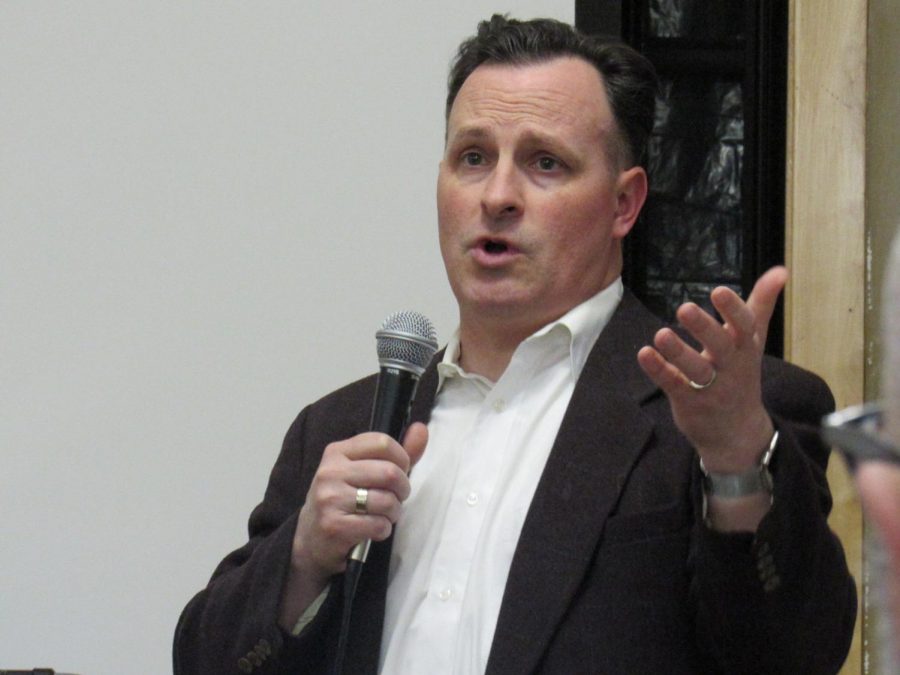Searching for a solution
The fundraiser, held at New City of Nations Church, focused mainly on the prevention of gun violence.
Minnesota State Representative John Lesch discusses gun control.
April 18, 2018
As the stormy weather raged outside, Research Manager of the Center for Homicide Research, Jeff Mathwig, as well as State Rep. John Lesch (D-66B) and State Sen. Sandra Pappas (D-65), stormed up solutions to the gun violence which yet again has troubled our nation.
Beginning in 1999 as the Minnesota Gay Homicide Study, the Center for Homicide Research, which gains one-third of its interns from Hamline, says its mission statement is to prevent homicide through sound empirical research, especially within marginalized communities. Although its original focus was the LGBT community, the center expanded its mission five years later to include all underrepresented communities, as they are the most likely to be affected by homicide.
In regards to the center’s priorities in 2018, Mathwig drew attention the number of highly lethal mass shootings that have taken place in recent times.
“Now, mass shootings have not necessarily increased in their frequency… the amount of mass shootings, year to year, has held pretty steady throughout the past few decades,” Mathwig said. “But mass shootings are becoming more lethal. More people are dying… It’s our duty to say, wow, maybe we should be focusing on that for the time being.”
In his speech, Mathwig gave a brief overview of Minnesota’s current gun laws, such as that one must be 21 to buy handguns, 18 to buy semi-automatic assault rifles, and must be a U.S. citizen with no felony convictions.
“We do see a lot of people talking about being focused more on mental health in order to prevent gun violence,” Mathwig said. “It does create a very strong negative stigma against individuals who are mentally ill, and what we typically see when we’re filling our database is that those that are mentally ill make up only a small fraction of individuals committing these mass shootings.”
Mathwig also gave tips from the Department of Homeland Security on how best to ensure one’s odds of survival against an active shooter. According to the DHS, the best thing you can do is run, then hide, then fight.
“We’ve seen cases where an active shooter has had five or six shots fired into them, and they’re still shooting,” Mathwig said, emphasizing why fighting was considered the last recommended resort.
According to Mathwig, only 13 percent of active shooters have a mental illness, and only four percent use assault weapons.
Representative John Lesch also addressed the crowd.
“This is my sixteenth legislative session,” Lesch said. “Throughout the course of my tenure in the legislature we have seen mass shootings across the country… I will tell you this, that after South Florida, the one difference that I’ve seen in my sixteen years after all those mass shootings, is these kids coming forward that have made a difference. Those high school kids are starting to change the minds of many people.”
State Sen. Sandra Pappas added to Lesch’s remarks, stating the need for stricter gun laws.
“When Australia decided to ban assault weapons, the number of mass murders went down significantly… We can talk all we want about school safety, and about mental health issues, and about being nice to that kid that was a little nerdy… Yes, he did have issues, but he also had guns,” Pappas said.
Pappas drew attention to the fact that it was Holocaust Remembrance Day, and pointed out a recent survey suggesting that many young people don’t know how many fatalities were suffered in the Holocaust.
“If we’re going to be in a world that says never again, we’re going to need to remember that,” Pappas said, “if you save one life, it’s as if you save the world.”


